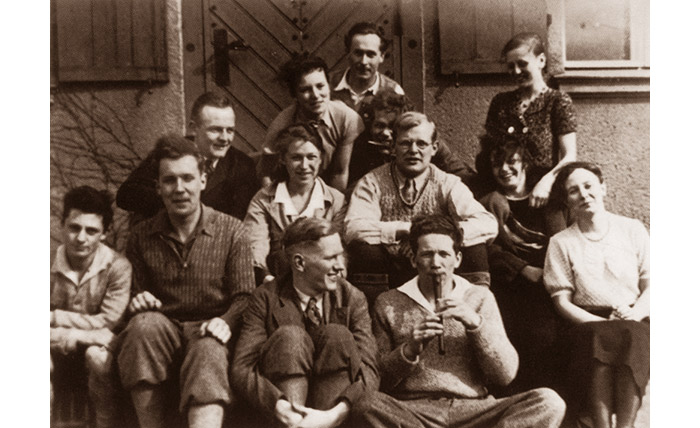Christ is my life
To be conformed with the Risen One – that is to be a new man before God. In the midst of death, he is in life. In the midst of sin, he is righteous. In the midst of the old he is new. His secret remains hidden from the world. He lives because Christ lives, and lives in Christ alone. “Christ is my life: (Philippians 1:21).
So long as the glory of Christ is hidden, so long, too, does the glory of his new life remain “hidden with Christ in God” (Colossians 3:3). But he who knows espies already here and there a gleam of what is to come. The new man lives in the world like any other man. Often there is little to distinguish him from the rest. Nor does he attach importance to distinguishing himself, but only to distinguishing Christ for the sake of his brethren.
Bearing willingly the sign of the cross
Transfigured though he is in the form of the Risen One, here he bears only the sign of the cross and the judgement. By bearing it willingly he shows himself to be the one who has received the Holy Spirit and who is united with Jesus Christ in incomparable love and fellowship.
The form of Jesus Christ takes form in man. Man does not take on an independent form of his own, but what gives him form is always solely the form of Jesus Christ Himself. It is therefore not a vain imitation or repetition of Christ’s form but Christ’s form itself which takes form in man. And again, man is not transformed into a form which is alien to him, the form of God, but into his own form, the form which is essentially proper to him. Man becomes man because God became man. But man does not become God. It is not he, therefore, who was or is able to accomplish his own transformation, but it is God who changes his form into the form of man, so that man may become, not indeed God, but, in the eyes of God, man.
Christ transforms those who recognize their Redeemer
In Christ there was re-created the form of man before God. It was not an outcome of the place or the time, of the climate or the race, of the individual or the society, or of religion or of taste, but quite simply of the life of mankind as such, that mankind at this point recognized its image and its hope. What befell Christ had befallen mankind. It is a mystery, for which there is no explanation, that only a part of mankind recognize the form of their Redeemer. The longing of the Incarnate to take form in all men is as yet still unsatisfied. He bore the form of man as a whole, and yet He can take form only in a small band. These are His Church.
Excerpt from Ethics, by Dietrich Bonhoeffer, pgs 82-83. Ethics is an unfinished book by Dietrich Bonhoeffer that was edited and published in German after his death by Eberhard Bethge in 1949. An English translation was published in 1955 by Macmillan Publishing Company, New York. Bonhoeffer worked on the book in the early 1940s and intended it to be his magnum opus.
Top image credit: Deitrich Bonhoeffer with his Berlin university students, 1932; Source: Photo biography Dietrich Bonhoeffer. Pictures from his life, edited by Eberhard Bethge, Renate Bethge and Christian Gremmels, © Gütersloher Verlagshaus GmbH, Gütersloh 2005.
Dietrich Bonhoeffer (1906-1945) was a German Lutheran pastor and a founding member of the Confessing Church. He was the first of the German theologians to speak out clearly against the persecution of the Jews and the evils of the Nazi ideology. In spring of 1935 Dietrich Bonhoeffer was called by the Confessing Church in Germany to take charge of an “illegal,” underground seminary at Finkenwalde, Germany (now Poland). He served as pastor, administrator, and teacher there until the seminary was closed down by Hitler’s Gestapo in September,1937.
In the seminary at Finkenwalde Bonhoeffer taught the importance of shared life together as disciples of Christ. He was convinced that the renewal of the church would depend upon recovering the biblical understanding of the communal practices of Christian obedience and shared life. This is where true formation of discipleship could best flourish and mature.
Bonhoeffer’s teaching led to the formation of a community house for the seminarians to help them enter into and learn the practical disciplines of the Christian faith in community. In 1937 Bonhoeffer completed two books, Life Together and The Cost of Discipleship. They were first published in German in 1939. Both books encompass Bonhoeffer’s theological understanding of what it means to live as a Christian community in the Body of Christ.
He was arrested and imprisoned by the Gestapo in April 1943. On April 8, 1945 he was hanged as a traitor in the Flossenburg concentration camp. As he left his cell on his way to execution he said to his companion, “This is the end – but for me, the beginning of life.”



